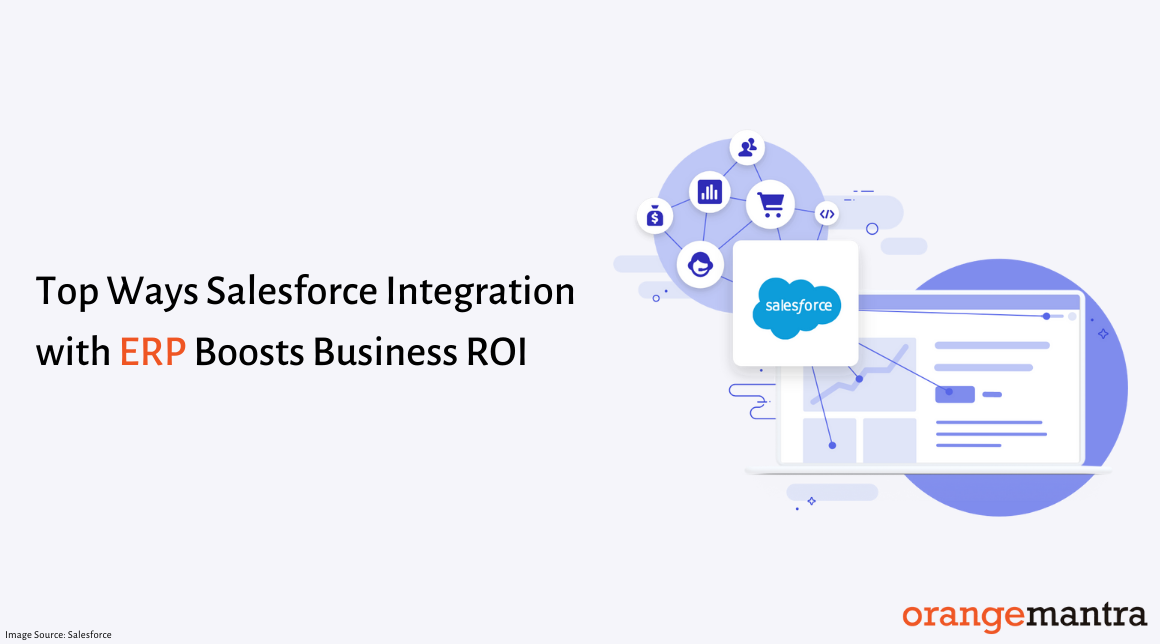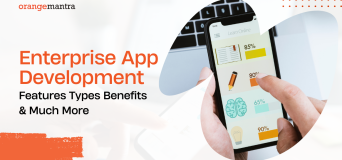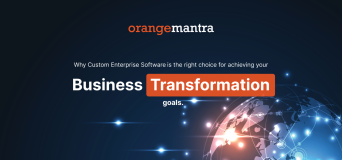Successful integration of Salesforce CRM with ERP (enterprise resource planning) leads to a significant rise in technology ROI. Salesforce CRM can automate various enterprise-level tasks and integrating it with financial ERP helps in equal distribution of data across the organization. Ultimately, teams across the company can seamlessly come together and collaborate. Businesses make the most out of immersive growth opportunities to experience organizational success.
A growing number of companies uses Customer Relationship Management (CRM) software worldwide, with remarkable inclination given to Salesforce. CRM software revenues have overtaken database management systems to become the largest of all software markets. CRM is the fastest growing software market, with revenues expected to reach over $80 billion by 2025, according to a Grand View Research report.
On the other side, ERP is also widely accepted across companies that will expect to reach $95.7 billion in the coming few years. And, not to forget, 62.7% of the organizations go with Cloud-based ERP to create and augment high-quality data.
Now, integrating Salesforce CRM with ERP solutions will result in creating two of the most profitable essential systems. The integration helps enterprises swiftly collaborate, communicate, increase workflow efficiencies, and create distributed flow of data. It further helps the enterprise quickly access critical business information related to customers, suppliers, and business partners. Moreover, you can extend the working capabilities of diverse enterprise’s departments including Sales, Finance, Customer Service, Marketing, and more.
Why Should You Integrate Salesforce CRM with ERP?
To understand the relevance of Salesforce integration with ERP, let’s take a simple example of a new customer.
For example, when a new customer enters into your Salesforce CRM, its data shows up in the finance, invoice, and other customer-related reports. For ERP, you have to manually enter the customer’s data from CRM to carry out additional business functions. Now, to save time and keep the same day saves automatically flowing through the company, integrate Salesforce CRM with ERP solution.
With this integration, enterprises can manage better day-to-day operations along with an enhanced way to:
* Deal with customers
* Enhance customer service
* Increase data visibility across different departments
* Allowing sales, customer service, & accounts team operate faster
* Automate data management tasks
* Increase data accuracy
Top-Notch Benefits of CRM and ERP Integration
-
Synchronized Data Across all Systems
An enterprise comprising different teams has several team members who understand a particular system. Just like, the sales team is accustomed to better understanding the functioning of Salesforce and fetching relevant data accordingly. On the other hand, finance professionals are much more familiar with ERP.
Now, Salesforce integration with ERP allows respective teams belonging to different departments to access information from anywhere. The integration helps to distribute the same data across the organization and respective team members can switch to their favored software to access necessary information with which they are most familiar.
-
Gain Profitable Insights to Grow More
In the present-day competitive environment, enterprises can use the vast amount of data to enhance conversions & make actionable insights. It is possible when data flows throughout the organization and members have access to the same. With the successful integration of Salesforce CRM with ERP, enterprises will see an integrated flow of data across different departments. Thus, employees receive updated information from any department to make decisions go faster and productive. In addition to that, the company’s top management will have a clear look at enterprise-level activities and manage a strong control over departments and various projects.
-
Seamless Communication Across Departments
By integrating the functionalities of Salesforce and enterprise resource planning, you find a quick and seamless flow of information across the company. This led to teams having all the data ready with them and utilized to take relevant decisions, create a strategy, reach customers, and offer a more valuable exchange for the business growth.
-
Offer Better & Profitable Customer Service
53% of the companies have already invested in CRM integration with ERP and witnessed excellent customer relationship management. By integrating two different systems of an enterprise, you get a better picture of the customer journey. Know the in-depth details of data from customer acquisition, purchasing history, payment transactions, and order history. This view of customer behavior helps in better managing and improving customer relationships to an optimum extent. Ultimately, you flourish as a business organization by understanding all that your customer wants.
-
Reduced Errors
The manual process of making data entries leads to errors at some point in time. The respective employees have to enter a huge chunk of data within the system. This process increases the likelihood of errors, which is difficult to get rectified and fixed.
Now, with the strategic integration of Salesforce CRM and ERP, get things automated in a swift manner. All the data will be automatically entered into the system with data checks and creating a balance. It will help in reducing the number of errors and team members no longer required to make multiple data entries. Overall, business errors will get reduced to an optimum extent and value given to result-oriented tasks only.
It’s Time to Integrate Salesforce CRM with ERP System
Thinking of integrating the two systems certainly conducts a profitable approach for companies. What is more important is how to make it happen? Well, the integration process requires an expert Salesforce partner having a distinctive set of skills and expertise. You can either hire full-time or part-time Salesforce experts with in-depth knowledge of ERP systems.
In the above matter, get an optimum level of support from OrangeMantra, as your ideal Salesforce CRM integration partner. They will rapidly help you integrate the two systems extensively as per your business requirements. Thus, know more about the successful integration process by getting in touch with experts here.
FAQs
- What is Salesforce Integration?
Salesforce Integration is an end-to-end process of integrating the features and functionalities of CRM with any of the existing business applications. The integration provides a unified view of the two systems helping employees to make better decisions.
- What is the Need to Implement Salesforce Integration?
Salesforce is a powerful CRM for all the marketing and sales professionals to get a 360-degree view of customers and the enterprise. By integrating CRM with other databases of the organization, it brings more value and in-depth information to professionals.
3. How Many Types of Integrations are Available with Salesforce?
There are a total of five types of Salesforce integrations available that are as follows”
* Near Real-Time Integration
* Batch Integration
* Real-Time Integration
* AppExchange
* Real-Time Mashups






















